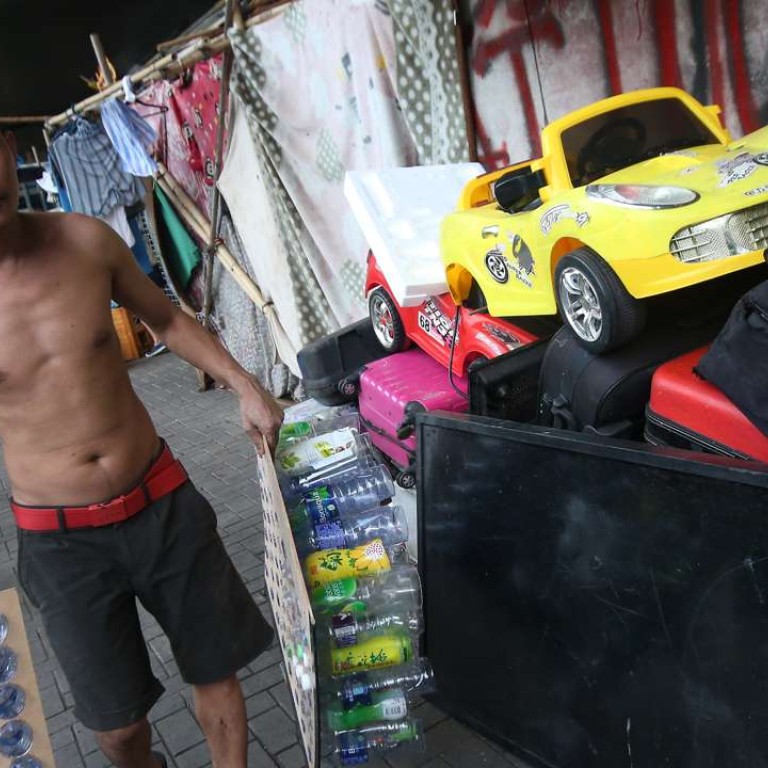
Meet the Vietnamese expats making a difference to Hong Kong’s homeless
Volunteers distribute necessities and build air cooling systems, among other projects, to help city’s Vietnamese refugees and local homeless population
In a modest workshop perched above a side street in Yau Tong, four expatriate women sat at a wooden table, diligently cutting pentagon-shaped holes in bottle caps with small knives and chatting in Vietnamese.
In another workstation just across the room, another cluster of people were also hard at work, drilling into a thin piece of wood.
They are a grassroots group of expat volunteers making an environmentally friendly and low technology air cooling system out of used bottles and wooden parts – a system they hope will help the homeless population living on the streets of Sham Shui Po, said Nina To, who organised the gathering.
“We were thinking of ways that these homeless people could tackle the heat. A lot of them raised the concern that they can’t sleep,” To said. “We don’t know whether it will work, but we’re building it for them.”
It might seem like a strange way to spend a Sunday afternoon. Yet for To and other volunteers, it was just one of many projects they are working on to help the city’s homeless population, where some of the most vulnerable are Vietnamese.
More than 200,000 refugees from Vietnam fleeing poverty and communism made their way to Hong Kong where they lived in 40 camps from 1975 to 2000. While about 70,000 were repatriated and 140,000 settled overseas, the remaining 1,000 or so were issued local identity cards.
Although they were allowed to gain permanent residency after seven years of living in the city without breaking any laws, many remain in limbo and homeless to this day. Most of the homeless Vietnamese in the city now are either refugees who have been here for decades, economic migrants or protection claimants.
To and her family were among a wave of refugees who reached Hong Kong in 1987 when she was just five years old.
After spending three years in refugee camps, she and her family emigrated to Australia, where she built a life for herself and became a banking professional. To, who is now 34 years old and a stay-at-home mother, moved to Hong Kong with her husband last May.
It had been about two decades since To had been in Hong Kong, and she knew nothing about the local Vietnamese homeless population.
She first found out about where they resided through a Vietnamese restaurant owner who told her about their poor living conditions.
After the meal, the owner took her to an area in Sham Shui Po where many refugees and homeless locals reside.
“I was quite taken aback. It was just a disturbing sight. It was very sad when I saw the conditions they were living in,” she said. “That’s when I decided we needed to do something about this. That’s when I formed the group.”
To and a few others created a grassroots volunteering group in November which has now grown to about 35 members on Whatsapp and more than a hundred on Facebook. With 15 active members, the group has organised various activities including distribution runs for the homeless in Sham Shui Po, cooking for refugees in Tsim Sha Tsui, taking the elderly out for haircuts and helping individuals who reach out to them on a case-by-case basis.
For their latest project – building an air cooling system – they are working with Georg Hoehne, a German humanitarian aid worker who specialises in transporting innovative technologies to poor communities.
Having worked on projects in various countries, Hoehne is currently a maker-in-residence at DIY space MakerBay in Yau Tong, and is working with NGOs in the city on different projects. He reached out to the group because he wanted to build something to help the homeless Vietnamese in Sham Shui Po.
“Some NGOs already work with this community, which is how I know them. But this community, I couldn’t work with them because they are Vietnamese and they don’t speak English or the local language. Even social workers from different NGOs don’t have access,” he said.
“The only group who has access is this group. We hope to bring [this system] to the community and if they like it, they can start building.”
During their distribution runs, volunteers will visit the homeless site in Sham Shui Po and pass out food and necessities such as clothes or hygiene products. The group is entirely self-funded, and raises money through personal networks.
The group also helps the local Chinese homeless population in the area, To added.
“One old lady who suffered terminal cancer passed away this week. We had the privilege of being able to treat her to a nice hair cut and a wash, a meal of her choice and a replacement wheelchair a few weeks [before] her death,” To said.
Farah Dang, an expat who also helped form the group, said that she was passionate about helping the homeless Vietnamese population because she is also Vietnamese. Although she relocated from the UK to Hong Kong seven years ago, she did not know about the community until last year.
“I didn’t even know there was this community in Sham Shui Po [and that] quite a lot of Vietnamese people were living there,” she said.
“It’s heartbreaking. I find that a lot of them, what they really need is someone listening to them and talking to them [in Vietnamese]. Some speak Cantonese, but the majority speak Vietnamese because they are economic migrants.”
Dang stressed that the group was not looking to make a name for itself and did not plan to become an official organisation. Volunteers just want to be able to help in any small way that they can, she said.
“We’re making a small difference, slowly and steadily,” Dang said. “Hopefully we can continue to do whatever we can for them.”
For more details, visit the group's Facebook page

